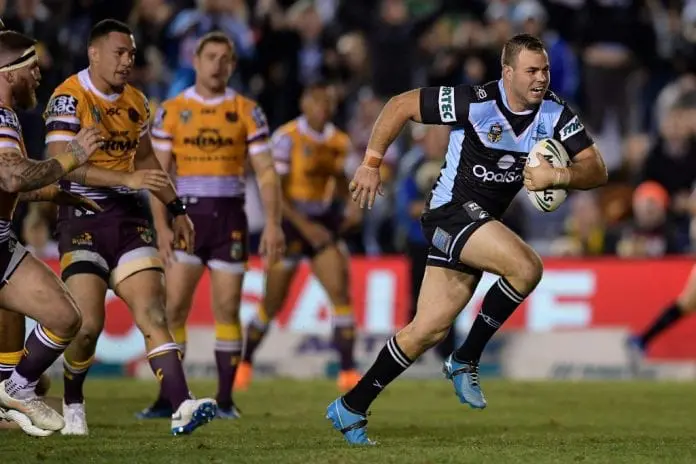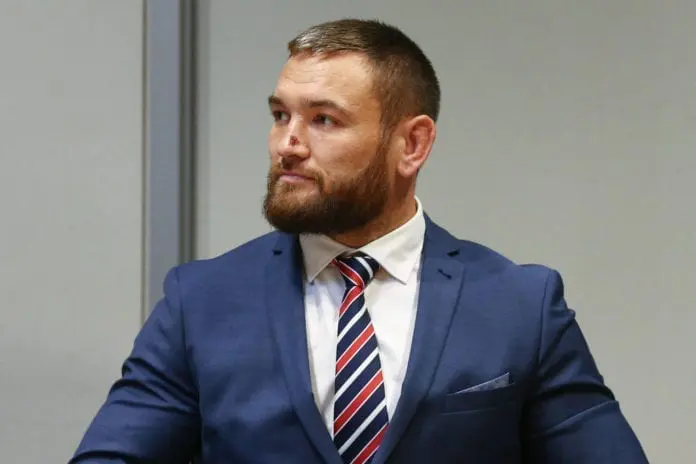A number of current NRL players have hit back at NRL Head of Football Graham Annesley’s claim that players who keep attracting judiciary charges could be hit with higher fines, claiming the NRL’s financial punishments are not deterring repeat offenders.
The issue has been thrust into the spotlight following Nelson Asofa-Solomona’s performance against the Roosters, with the Melbourne Storm colossus earning another dangerous contact charge – his fifth finable offence of the year- without spending any time on the sidelines.
Asofa-Solomona has paid $11,800 in fines this year without missing any football, while Roosters prop Jared Waerea-Hargreaves also received his fourth charge of the year without suspension.
Under the previous judiciary model, players were open to receiving suspensions after their third monetary offence.

While Annesley suggested during his weekly press conference that repeat offenders may receive an increase in grading for multiple offences, NRL veterans Dale Finucane and Wade Graham say the current system is failing to protect players and discourage foul play.
“Any player who has had a number of low-level grade one charges, if the MRC feels they aren’t getting the message, they have the right under the rules to say ‘you need a stronger personal deterrent’, so therefore your grade one charge will be elevated to a grade two.”
Despite the statement, there was no mention of using Asofa-Solomona or Waerea-Hargreaves as an example despite their records this year.
“The fines aren’t a deterrent,” Finucane told the Sydney Morning Herald.
“People don’t want to miss games. No one wants to be fined either, but I’d say the game matters more.
“You don’t want to see players miss games but there also has to be a duty of care. You can’t be going in with high tackles and some of the other things we’re seeing.
“I don’t think the system we have is the most effective in deterring those avoidable things.”
Finucane himself was subject to judicial inconsistencies earlier in the year, when he spent a three-week stint on the sidelines following an accidental head-clash with Stephen Crichton – with ‘duty of care’ being a primary concern during the hearing.
The fine system has been a sticking point in discussions between the NRL and Rugby League Players Association (RLPA), with the latter being strongly opposed to the reclassification of grade one shoulder charges and crusher tackles as monetary punishments.

Sharks captain Wade Graham, who was part of the RLPA delegation that met with Annesley last off-season, said an overhaul of the fines system should be looked at before 2023.
“To be fair, we do that every year, you’ve got to look at opportunities to improve the game and get better,” Graham told the Herald.
“It’s a tough, physical game and the short clips (of bad incidents) don’t look great. But I think what everyone wants to see is consistency.”























“The fines aren’t a deterrent,” Finucane told the Sydney Morning Herald.
“People don’t want to miss games. No one wants to be fined either, but I’d say the game matters more.”
My understanding is that players are paid a comparatively low sum each week for 52 weeks, then when the season starts they get an appearance bonus and a win bonus. (If I’ve got this wrong, please tell me!)
As long as the appearance bonus is greater than the fine – and I expect it comfortably will be – then fines will be no deterrent: the player will lose a lot more money by being suspended for a week than he would pay as a fine.
In addition, the fines are the same for each player, irrespective of ability to pay. JWH may have been fined $11,800 this year, but given his salary that is just peanuts to him. If fines were based on a percentage of salary, then the NRL could charge offenders an amount that would be a genuine deterrent, without bankrupting players on minimum pay.